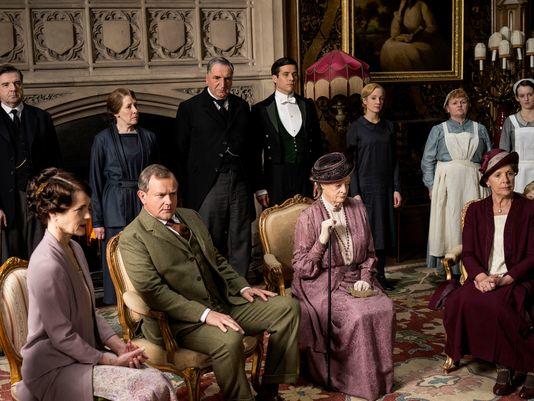
"Downton Abbey" creator Julian Fellowes has been asked many times why his hugely popular TV show went over so well with Americans. And his answer has always been, he honestly doesn't know. One could ask a similar question concerning the other massive hit from across the pond; "Sherlock," starring the international phenomenon that has become Benedict Cumberbatch.
Well, I have a theory as to why such shows gained a large following in the U.S.
There are a number of reasons, in fact, but let's start with what I consider to be the most obvious: Our television shows can be - and often are - embarrassingly bad. Stupid, poorly written, badly acted, downright ugly and adolescent, etc. I'm reaching the point where I'm about ready to ditch cable because I feel brain cells dying as I cycle through the trash commonly found on our hundreds of channels. There are a few highlights over the years (I've liked "Leverage," "The Blacklist," "Forever" and "Manhattan Love Story," for instance; and was pissed the latter two were cancelled). But frankly, we don't have anything that can really reach the level of overall quality on display in "Downton Abbey" and "Sherlock."
I figure everybody knows this, but we should also realize there's a group - that hopefully grows larger and more vocal as time goes on - of Americans who simply can't tolerate the likes of "Honey Boo-Boo" and "Party Down South." We're starved for quality and we admit it. And when we see it, we latch on like a once proud and secure Titanic traveler snatching at a life preserver.
Beyond that, however, there's a more interesting societal twist: "Downton Abbey" portrays a system this country has always disliked and in fact, has come to loathe. Most Americans now would spit on white, privileged, aristocrats, and wouldn't care at all about their elitist first-world problems and outdated principles. Now, while it's true that "Downton Abbey" shows the flaws in such an obviously flawed system, and presents us with a time period in which the system is forced to change or die (and as a result, the characters must change as well), it also shows us that there is some value in that way of life.
Not in regards to oppression or class-warriors or anything like that; rather, in the little things that once made civilized life civilized. Maybe one of the reasons so many of us in this country kept watching the show is because we're sick of seeing hordes of unkempt, unwashed, ill-mannered boors shuffling through Wal-Mart in their pajamas. Maybe we've gone too far in the "right" direction; perhaps we all acknowledge that obsessing over the proper way to fold a handkerchief and display it in the lapel of one's dinner jacket is a tad ridiculous, but there's a big gap between that and...well, what we see today.
Civility, propriety, charm, etiquette, charisma, respect; these are words that we only vaguely understand today, and frankly, it's because we've honestly come to believe they're unnecessary. We've reached the point where, like a bunch of children on a playground, we mock people for using proper grammar or dressing well. We're not merely saying such civilities aren't necessary; we're actually trying to say they're bad.

They never were bad. All we're really saying today is not that we've advanced beyond the folding of the handkerchief, but that we're just too lazy to bother with the idea. Laziness is at the core of all of this, not progressive thinking. And that's the long and short of it, and another very good reason why I believe lots of people enjoy simply looking at "Downton Abbey." A time and place where those words above actually had meaning and value and you know, it's actually quite pleasant. People seem like adults when they act correctly, don't they?
One last thinig to consider: Those who like to call this show an "upscale soap opera" or something along those lines is missing one critical point: Soap operas are inane basically by definition. And that's exactly the opposite of what "Downtown Abbey" was and is.
Most Helpful Opinions